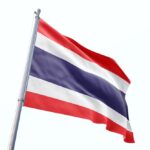Thai police raid Miss Universe team for allegedly promoting online casinos

Authorities in Thailand have launched an investigation into the Miss Universe 2025 pageant in relation to the illegal promotion of online casinos.
It is alleged that contestants had been promoting online casinos while staying at their accommodation in Thailand in the run-up to the pageant, a practice that is considered illegal under Thai law.
Investigators are examining a photograph of Miss Philippines in which she appears with a pillow bearing a sponsor’s logo thought to be linked to a Philippine gambling operator. The organizers of the pageant stated that they are not affiliated with this company.
The 74th Miss Universe Thailand Host Committee released a statement following the investigation, distancing itself from the competition.
It reads, “Miss Grand International Public Company Limited would like to inform the public that, following the recent incident during the 74th Miss Universe Thailand event, it has come to our attention that the Miss Universe Organization (MUO) promoted one of its sponsors associated with online casinos – an activity that is strictly illegal under Thai law.
As the official host of the 74th Miss Universe Thailand, Miss Grand International Public Company Limited hereby clarifies that the company has no involvement whatsoever with such activities or any form of publicity related to online casinos. The promotion was carried out solely by the Miss Universe Organization (MUO).”
This investigation comes after Thai police shut down an online gambling operation in Prachuap Khiri Khan province.
Verticals:
Sectors:
Topics:
Dig Deeper
The Backstory
A pageant probe rooted in an escalating crackdown
Thai authorities’ scrutiny of alleged online casino promotion tied to Miss Universe activity lands amid a clear shift in how the country confronts illicit gambling. Police and cyber units have been moving beyond headline raids to target the digital infrastructure, financing and marketing that sustain underground platforms. That cadence gives context to why a photo of a contestant alongside a sponsor logo suspected of gaming ties would draw immediate attention and why organizers issued rapid public denials. Regulators have been signaling that the boundary between entertainment sponsorships and illegal gambling promotion is narrowing.
The playbook has been on display in recent months. Thailand’s Cyber Crime Investigation Bureau has dismantled ring after ring by following payments and operational roles, not just storefronts. In one operation, police said they took down an unlicensed network that processed more than THB100 million in wagers over three years, allegedly led by a former Muay Thai champion operating the site g2g69bet. Investigators mapped discrete job functions across site administration, fund flows and customer handling before coordinating raids across multiple provinces, arrests and asset seizures. The case, codenamed Knock Out 100-Million Gambling Website, shows how enforcement is increasingly coordinated and data driven. Read more about that case in the bureau’s takedown of a THB100 million igaming ring led by a former fighter.
Officials have paired those complex probes with rapid interventions against smaller operations that feed the ecosystem. Those actions underscore an intent to interrupt the growth funnel of illicit sites, from user acquisition to cash-out channels, and they form the backdrop for the heightened sensitivity to any perceived marketing that could drive traffic to offshore operators.
From storefronts to scripts: where illicit play happens
Authorities have broadened the target set from in-person hubs to digital touchpoints. In Chiang Rai’s Mae Chan district, cyber police seized devices and detained an alleged site administrator following an investigation into a platform that facilitated automated deposits and streamlined withdrawals through the site’s interface. Officials said the site drew about 9,000 users and roughly THB5 million a month, signaling a scalable, low-profile operation that required little physical footprint. Details appear in the case of a Chiang Rai online casino administrator arrested during a cyber raid.
The methodology mirrors wider trends in Asia. In Tokyo, police have pursued hybrid models that bridge on-site facilitation with online gameplay. In one raid in the Kabukicho district, officers arrested a dozen people at a shop accused of letting customers play baccarat for real money on overseas sites. Investigators seized at least 20 computers and said data pointed to more than 5,000 customers, suggesting the physical location acted as an onboarding conduit to offshore platforms. Japanese authorities have tightened restrictions and moved against promotional content targeting residents, underscoring a zero-tolerance line on any online casino activity deemed illegal. See how Japanese police described the scope of that storefront-to-online model in an online gambling raid in Tokyo’s Kabukicho.
These cases highlight a common thread: enforcement is following the customer journey. Whether through a storefront that plugs users into offshore platforms or a website that automates deposits and withdrawals, investigators are targeting the points where users learn, register and transact.
Cross-border networks draw sharper responses
Crackdowns have extended to regional hubs where cross-border crews and coerced workers operate illicit sites. In Phnom Penh, Cambodian police said they detained around 170 foreign nationals in a condo raid that uncovered alleged online gambling activity, drugs and suspected trafficking. Authorities confiscated laptops, phones and passports and sent detainees to immigration for investigation and potential deportation. Cambodia formally halted igaming in 2019, but recurring enforcement actions show how operators continue to shift locations and staffing models to evade detection. The breadth of the operation is detailed in a report on a Cambodian cyber police raid that netted about 170 suspects.
These regional cases matter for Thailand because supply chains for illicit gambling often run through neighboring states. Payment processing, site hosting, content management and customer service can sit offshore even as marketing and user acquisition occur locally. As Thai police tighten domestic pressure, operators may lean more on foreign networks, reinforcing the need for cross-border cooperation and multiagency investigations that address trafficking, money laundering and cyber offenses in tandem.
Marketing and influencers become legal exposure
The alleged promotion tied to a global pageant lands squarely in a growing focus area: advertising. Authorities are not only disrupting operators but also scrutinizing the promoters who funnel audiences to offshore sites. Kazakhstan provides one example of an escalating response. The Financial Monitoring Agency has warned that fines are insufficient deterrents for influencers who advertise offshore casinos and is weighing criminal penalties by classifying such promotion as aiding illegal gambling. Officials say they have blocked over 17,000 links and acted against more than 200 illicit operations this year, yet repeat promotion persists because ad revenue exceeds current fines. Lawmakers banned promotion of online casinos, sportsbooks and pools across media in 2024, and authorities report dozens of blogger arrests and hundreds of charges. An overview of that policy turn appears in a piece on how Kazakhstan aims to penalize influencers for promoting online casinos.
The same logic is emerging elsewhere. Japan’s steps against overseas casino promotion and Thailand’s attention to platform branding point to a legal environment where the definition of “promotion” is expanding. That creates risk for entertainers, sponsors and event organizers operating in markets with strict gambling laws, even if the operators they engage with are licensed in other jurisdictions. What once looked like routine brand placement can become legal exposure if authorities deem it to be encouraging access to illegal services.
What is at stake for events, sponsors and platforms
The current probe underscores a fault line for global events hosted in jurisdictions that prohibit online gambling. Sponsorship portfolios have grown complex as brands seek reach across borders, but regulators are narrowing tolerance for any association that could be construed as driving users to unlawful sites. As Thai police focus on the bridge between audiences and offshore operators, even indirect signals, like a pillow logo in a backstage photo, can trigger enforcement interest.
For organizers, the operational takeaway is rigorous due diligence and clear separation from sponsors tied to gambling in restricted markets. For brands, the risk calculus now includes not just advertising guidelines but also potential criminal scrutiny if their promotions intersect with illegal services. For platforms, user acquisition strategies that rely on influence marketing or ambiguous sponsorships are facing a higher bar and more immediate disruption.
The regional pattern suggests this is not a one-off. Thailand is aligning on methods seen in Japan and Cambodia and watching deterrence models like Kazakhstan’s. The convergence means more frequent, coordinated actions against the full illicit gambling stack: operators, facilitators, payment rails and promoters. That is the context enveloping the latest investigation and why the response from pageant officials was swift. In a market where authorities are connecting the dots from branding to betting, the space for ambiguity is shrinking fast.








